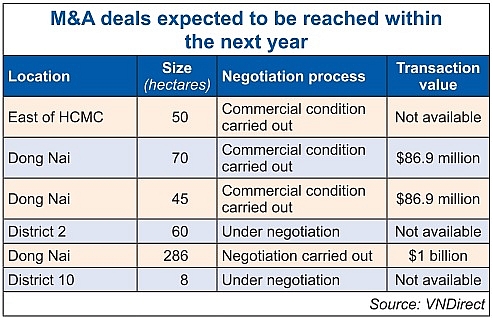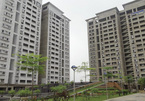A recent report released by VNDirect Securities Corporation stated that mergers and acquisitions (M&A) deals, especially in transferring part of large-scale real estate projects, were considered one of the fastest solutions for foreign developers when they want to jump into the Vietnamese real estate market, as well as for the domestic developers expanding their land fund and investment portfolios.
This report also cited that some projects from giant developers are currently in the negotiation process with most expected to be completed this year.
“Thanks to the improvement of the legal system in the Law on Investment, a range of deals will be done within this year with total value up to more than $1 billion,” the report cited.
According to Tran Khanh Hien, deputy director of the Research at VNDirect, the real estate market in 2021 will be step-by-step resumed at its active level, based on the economic recovery, rising housing demand, and increased supply due to a range of projects that will be permitted to continue after long delays to review procedures.
The Gem Riverside, funded by domestic developers Dat Xanh Group, and the Eco-smart city at Thu Thiem from South Korea’s Lotte Group, are among those looking to be kicked forward.
Developers cited that M&A deals in real estate are a motivation for developers to be resumed after a long time of being impacted by the ongoing pandemic.
Nguyen Thai Phien, senior financial director at Novaland Group, said that the corporation is based on M&A deals in order to develop its land fund and business for long-term development.
Novaland started collecting land in 2005 via M&As and currently boasts more than 700 hectares in the east of Ho Chi Minh City, 700ha in Dong Nai province, and more than 2,000ha in Phan Thiet of Binh Thuan and Ba Ria-Vung Tau provinces.
Asian activity
Masataka Sam Yoshida, head of the Cross-border Division of RECOF Corporation, said that the trend of Japanese companies into Vietnam is increasing.
The Vietnamese real estate market is presented with a range of large-scale Japanese developers such as Mitsubishi, Nomura Real Estate, Daiwa House Industry, Sumitomo Forestry, Creed Group, Samty Asia Investments, Kajima Corporation, and more.
Most of the sectors in Japan, according to Yoshida, have developed to its highest level so they need to find new markets to expand outside of Japan.
The second factor is the M&A growth strategy supported by the abundant accumulated money over the past 20 years, reaching trillions of US dollars.
“Japanese businesses are still looking to Vietnam in the process of searching and expanding markets, taking advantage of the young population. The interest from Japanese investors in Vietnam is huge, even during the pandemic,” Yoshida commented.
“Once travel restrictions are lifted, a huge wave of Japanese companies waiting to take up investment procedures will appear very soon,” he added.
Similarly, a representative of the Korean Business Association in Vietnam also said that businesses there are very interested in the consumer goods, food and beverage, and retail industries.
“In addition, real estate is a field of large profit margins, long-term efficiency, and is always a channel to attract investment to South Korean investors,” the representative said.
 |
Increasing the heat
Elsewhere, housing land and industrial real estate are expected to stir up the M&A market in the next 12 months.
Kim Ngoc, director of Valuation and Advisory Services at Colliers International, cited that the amendments and updates in the laws in investment, securities, and enterprises will make M&A activities more active after many inappropriate regulations have been removed.
“Combined with Vietnam’s achievements in 2020 of successfully controlling the pandemic and achieving the highest possible growth rate, there are many reasons to believe that M&A activities will recover quickly. Sectors that can attract more M&A are real estate, retail, and consumer goods,” she said.
Newly-signed trade agreements and the movement of many giant manufacturers and multinational groups are playing a significant role in the M&A trend moving forward.
Apple recently chose Vietnam as its first base for manufacturing the iPad and MacBook after China, demonstrating that high-quality investment flow is driving into Vietnam and helping realise deals in industrial properties, logistics, and support services.
One of the driving forces for such deals in Vietnam comes from foreign companies which withdrew from China to avoid risks related to US-China trade tensions. Notable destinations for these companies have included Indonesia, Spain, and Finland, as well as Vietnam.
The market in 2021 and beyond is also expected to blossom in city outskirts and satellite towns which are well connected with Hanoi and Ho Chi Minh City.
In the north, hotspots are projected to be the likes of Bac Giang, Bac Ninh, Vinh Phuc, and Haiphong when in the south, Binh Duong, Dong Nai and Long An are already on the radar of investors.
Vietnam ranked second out of 50 economies in the latest M&A Investment Index by Euromonitor, which reflects the expected level of investment, activity, and attractiveness of the global M&A market amid macroeconomic and financial shocks for 2020-2021.
With COVID-19 still complicated in many countries, most European governments are lowering their basic interest rates to reduce borrowing costs. These factors could create good opportunities for businesses to expand operations in foreign countries through the M&A channel, Euromonitor said.
The Institute for Corporate Investment, Mergers and Acquisitions expects that M&A in Vietnam will recover in 2021-2022, back to around $4.5-5 billion in 2021 and event up to $7 billion in 2022. Real estate will remain the second-hottest sector in M&A, behind finance and banking.
VIR

Real estate appeal remains amid tumult
Vietnam has more real estate investment opportunities than other more mature Asia-Pacific markets, though certain difficulties remain.